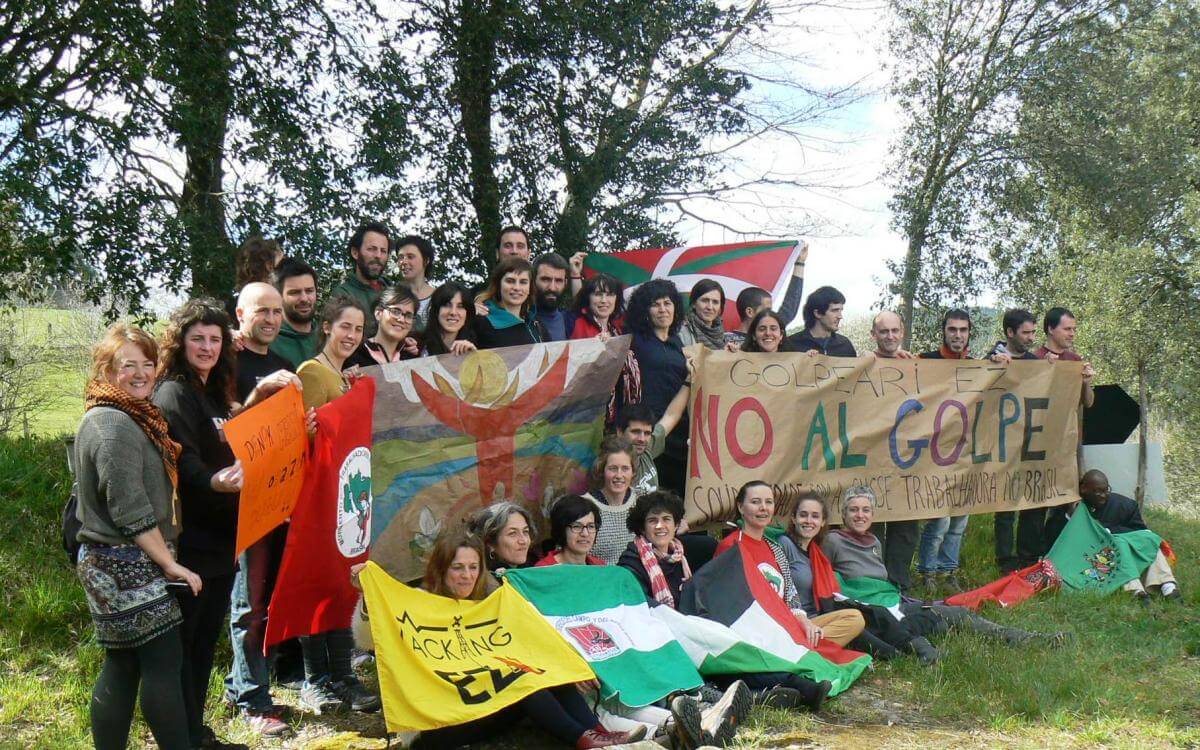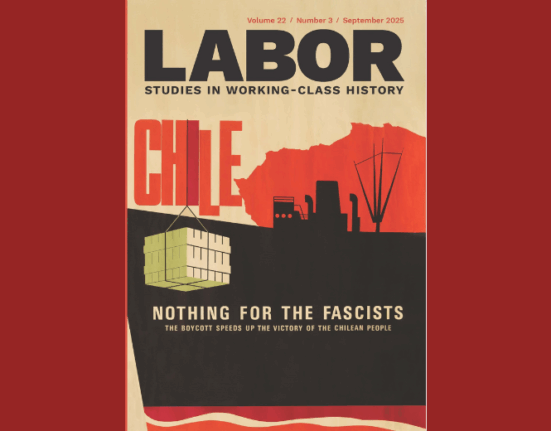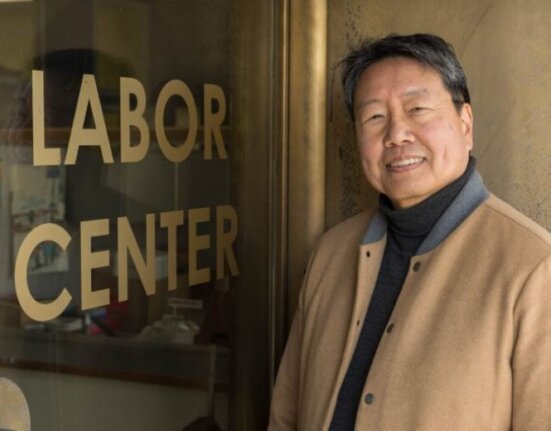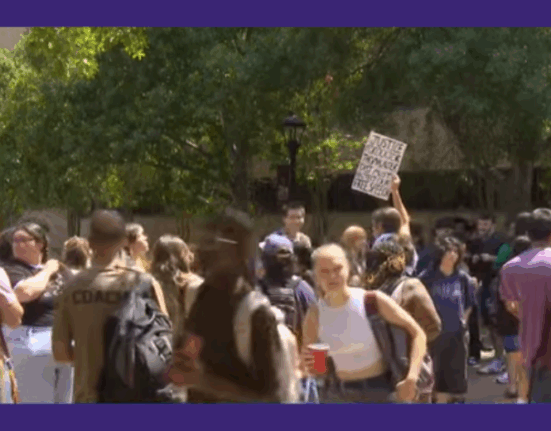My first face-to-face introduction to the solidarity economy in Southern Brazil was a visit to a recycling cooperative. Through hard work, the 16-member team had arranged for mountains of garbage to be dumped in their yard. Most of the coop members had worked alone previously, going street to street looking for plastics, paper, glass and metal, and then trying to sell their sorted waste to local companies.
Once they formed a coop, they were able to negotiate with garbage collectors and companies that use recycled materials in production to get better deals on both ends. It is tough work sorting through garbage, avoiding toxic chemicals, syringes and other harmful waste. Workers did not always wear gloves or masks, and the heat cooked the garbage. Coop members explained how much better it was to work in a group, although they still earned very little. At least, they stressed, the coop gave them access to income on a regular basis. Plus the Metalworkers Union helped set up training, including literacy, business skills and citizenship education.
Especially for those who have been excluded from the labor market historically, community-based cooperatives not only provide access to income but also build social collectives, and, increasingly, social and political awareness.
The MST, Landless Workers’ Movement, has mobilized thousands of workers in land occupations, with the aim of establishing agricultural cooperatives. Their success is due, in part, to their process of selection. Before land is targeted, the MST researches ownership, utilization and debts. MST looks for absentee landlords who owe money to the government. Through a long process of appeals, people can gain the right to settle on the land, as long as they pay off debts. After 12 years, the settlers own the land.

To organize families for the occupation and future settlement, the MST gives preference to groups of 10 or more families who have self-organized. Self-organization is a first step in community-building, and it tends to eliminate troublesome and uncooperative people. After filing a suit with the government, families set up an occupation near the land, often on the side of a highway. The occupiers I met had been in tents for almost 5 years, which is how long the legal process took. The rainy season had turned earth to mud, but they drew strength and spirit from the promise of land. They had sent some members to work in the city for income, while sending others to become doctors or teachers, often to Cuba, where education is free.
Itapui, an MST settlement outside of Canoas, has a number of long-established cooperative farms and farms that are independent but share resources. An MST leader explained how difficult it is for rural farmers to give up autonomy. These farms can be easily self-sustainable, but can they bring in income for growth? That’s where solidarity makes a difference. In Canoas, the city government buys its food for the public school system from these cooperatives, insuring regular income. The city also provides cooperatives the free use of public parks on the weekend to set up a market for community sales.
Stand-alone, larger cooperatives exist, where workers have taken over manufacturing facilities. I visited two, one a large metal plant serving the energy industry; it was able to capture suppliers and customers from the past. A smaller stove manufacturer had tried to close and remove machines during a Christmas break. Again with the help of the Metalworkers, hundreds of supporters stopped the movement of machines, filed a suit and began the process of takeover. In both cases, the union set up education programs during the transition period.

The Metal Workers Union (SNM) moved from organizing special classes to establishing a vocational school called Mosquito, in Porto Alegre. This school adapted as a core to their program citizenship education, as discussed in an earlier article. The education combines literacy, vocational skills with critical thinking (history, economics, politics…) and creates a process that builds common goals and awareness. The School serves thousands of unemployed youth.
There are very different kinds of cooperatives that make up the Solidarity Economy, from large manufacturing plants to a small caterers’ coop. While they both provide jobs and income for workers who would have had nothing, are they able to compete with firms in the capitalist marketplace or are they stop-gap measures to deal with a crisis of unemployment and poverty? A few firms can compete, but most are too small or under-funded to compete. However, they are not “stop-gap.”
The experiences and knowledge gained through these coops become transformational, raising expectations, providing solid economic skills, and building communities and self-confidence. They also create networks that join social movements in a struggle for a different system, in which they will all have equal opportunities and access. Every step in the creation of the Solidarity Economy relies on the everyday practice of solidarity across movements and organizations.

Big or small, the cooperatives practice solidarity often. When the Metalworkers decided to storm a GM complex in Sao Leopoldo—one that included all suppliers and assemblers, 5 miles around—the MST, the CUT, the coops, they all came out to help at 2am, even though the lot had armed guards at every gate. GM had recognized a company union instead of the Metalworkers. The government issued enormous fines, but they then got global help, except from the UAW. When the Federal university faculty went out on strike, every rally had flags of different organizations, federations and constituencies.
Without that solidarity, cooperatives could be picked off. Also without that education and training, from a workers’ perspective, they never would have gotten off the ground. The Metalworkers’ local in Canoas, for example, provides an office for the Cooperative Multiply (Cooperativa Multiplicar), one the earliest women’s catering cooperatives. The local uses the coop to cater events, and the women always come out for the union. The Coop is now a federation of coops, including dance (capoeira), recycled garment art, and more.
Acknowledging the importance of the cooperative movement, the Lula government (2003-2011) created a National Secretariat for the Solidarity Economy. Gatherings in all 27 states of the nation have led to the establishment of a National Forum for the Solidarity Economy that includes a 97-member coordinating committee and a 13-member Executive Board. With education as its engine, this Solidarity Economy has transformed lives for hundreds of thousands of people in Brazil. Education plus income create engaged citizens, by raising their visibility and elevating their positions within society.
Cooperatives have been producing a new generation of community leaders and activists who believe in the power of working-class solidarity.
Ruth Needleman, prof. emerita, IU, rneedle@iun.edu







